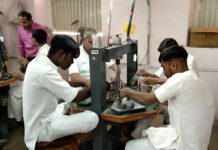Over the past few years, the number of hysterectomies have considerably increased in Beed district situated in the state of Maharashtra. To be particular, more than 4,500 young women got the surgery done.
Hysterectomy is a process in which women go under a surgery to get their wombs removed.
Reasons behind women going “womb-less”
On the surface, two main reasons can be seen behind women going “womb-less”-
1) Doctors are advising women to get hysterectomies so that they can earn more money from uneducated people
There have been cases where the doctors have told women to go under the surgery as it will save them from cancer.
They have also advised women that after the surgery, they can be more productive in fields which will again get the doctors handsome amount of money.

Mostly the uneducated population is not aware of the consequences this surgery has on their bodies. They are of the opinion that after their children have been born there is no use of the womb.
However, hysterectomy disturbs the hormone level of the body which can in return lead to many health problems and even cancer.
2) Women are seeing periods as a hurdle to a constant source of income
Women in this area usually take up the informal work provided in fields as Beed is a drought prone area where sugar cane is grown.
Hence, sugar cane cutting has become the main source of income for the women belonging to the low socioeconomic classes.
The work of cutting sugar cane begins around 6 in the morning and gets over by sunset which is around 6:30 in the evening.
Women, given their conventional role in society need to get up around 4 in the morning so that they can cook and do housework before going to the fields.
Also read: India Needs To Let Domestic Workers Have A More Respectable Place In Our Society

The field work also needs rigorous physical activity and upper body strength. After, sugar canes are cut, the women tie them into bundles and carry it on their heads to the storage place.
Women with a womb might be seen as less productive in the fields as they suffer abdominal pain, cramps and weakness during periods. Therefore, contactors might have put up a condition in front of women to get their wombs removed before being employed.
Or women might themselves see their periods as being a hindrance.
Given, that the work is informal in nature it is difficult to prove in courts that contactors are asking women to get hysterectomies done.
Also, because of the informal status of the work, women have to show up in the fields despite having ill health. Hence, they cannot afford to stay back home. This work does not have any income or job security.
Women who have undergone the surgery need to go for follow up sessions but they hardly ever show up given the nature of their work.
When they are working and have to urinate, they have to do it in the fields as long breaks are not allowed which can lead to infection and other health problems.

How can we address this situation?
Education is the most important aspect. In a country, like ours, where almost 80% of the population is in the informal sector needs education the most.
Firstly, education will provide people with better employment. Secondly, education will let the people be aware of their rights. They will also know what is good and bad for them.
We also need more schemes for employed women and a way through which they can know about these schemes.
Periods are still a taboo in under-developed places. Women even today use cloth instead of sanitary pads and it is this cloth that results in bad health often and not the period itself.
ASHA workers have been working towards changing this situation. At some places, they have been successful, but their reach is not universal.
Women need to be aware of their bodies and understand what is good and bad for their bodies.
Sources: The Hindu, Aljazeera, GVS
Image credits: Google images
Find the blogger at @kumar_darshna




























